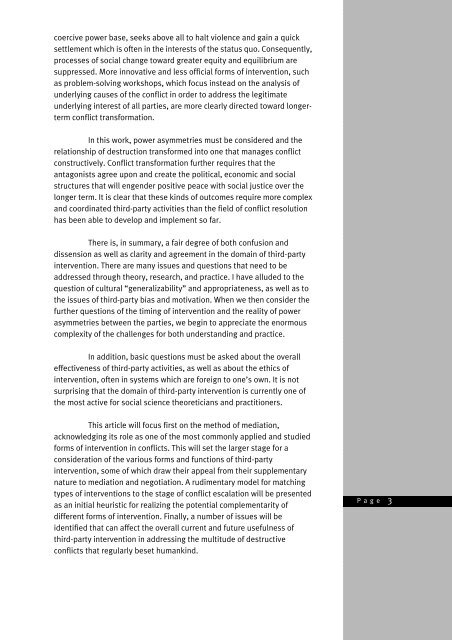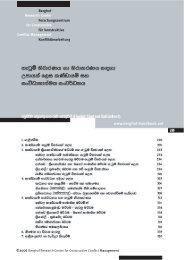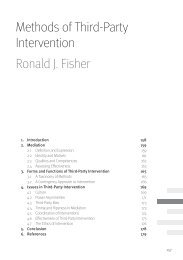Methods of Third-Party Intervention - Berghof Handbook for Conflict ...
Methods of Third-Party Intervention - Berghof Handbook for Conflict ...
Methods of Third-Party Intervention - Berghof Handbook for Conflict ...
Create successful ePaper yourself
Turn your PDF publications into a flip-book with our unique Google optimized e-Paper software.
coercive power base, seeks above all to halt violence and gain a quick<br />
settlement which is <strong>of</strong>ten in the interests <strong>of</strong> the status quo. Consequently,<br />
processes <strong>of</strong> social change toward greater equity and equilibrium are<br />
suppressed. More innovative and less <strong>of</strong>ficial <strong>for</strong>ms <strong>of</strong> intervention, such<br />
as problem-solving workshops, which focus instead on the analysis <strong>of</strong><br />
underlying causes <strong>of</strong> the conflict in order to address the legitimate<br />
underlying interest <strong>of</strong> all parties, are more clearly directed toward longerterm<br />
conflict trans<strong>for</strong>mation.<br />
In this work, power asymmetries must be considered and the<br />
relationship <strong>of</strong> destruction trans<strong>for</strong>med into one that manages conflict<br />
constructively. <strong>Conflict</strong> trans<strong>for</strong>mation further requires that the<br />
antagonists agree upon and create the political, economic and social<br />
structures that will engender positive peace with social justice over the<br />
longer term. It is clear that these kinds <strong>of</strong> outcomes require more complex<br />
and coordinated third-party activities than the field <strong>of</strong> conflict resolution<br />
has been able to develop and implement so far.<br />
There is, in summary, a fair degree <strong>of</strong> both confusion and<br />
dissension as well as clarity and agreement in the domain <strong>of</strong> third-party<br />
intervention. There are many issues and questions that need to be<br />
addressed through theory, research, and practice. I have alluded to the<br />
question <strong>of</strong> cultural “generalizability” and appropriateness, as well as to<br />
the issues <strong>of</strong> third-party bias and motivation. When we then consider the<br />
further questions <strong>of</strong> the timing <strong>of</strong> intervention and the reality <strong>of</strong> power<br />
asymmetries between the parties, we begin to appreciate the enormous<br />
complexity <strong>of</strong> the challenges <strong>for</strong> both understanding and practice.<br />
In addition, basic questions must be asked about the overall<br />
effectiveness <strong>of</strong> third-party activities, as well as about the ethics <strong>of</strong><br />
intervention, <strong>of</strong>ten in systems which are <strong>for</strong>eign to one’s own. It is not<br />
surprising that the domain <strong>of</strong> third-party intervention is currently one <strong>of</strong><br />
the most active <strong>for</strong> social science theoreticians and practitioners.<br />
This article will focus first on the method <strong>of</strong> mediation,<br />
acknowledging its role as one <strong>of</strong> the most commonly applied and studied<br />
<strong>for</strong>ms <strong>of</strong> intervention in conflicts. This will set the larger stage <strong>for</strong> a<br />
consideration <strong>of</strong> the various <strong>for</strong>ms and functions <strong>of</strong> third-party<br />
intervention, some <strong>of</strong> which draw their appeal from their supplementary<br />
nature to mediation and negotiation. A rudimentary model <strong>for</strong> matching<br />
types <strong>of</strong> interventions to the stage <strong>of</strong> conflict escalation will be presented<br />
as an initial heuristic <strong>for</strong> realizing the potential complementarity <strong>of</strong><br />
different <strong>for</strong>ms <strong>of</strong> intervention. Finally, a number <strong>of</strong> issues will be<br />
identified that can affect the overall current and future usefulness <strong>of</strong><br />
third-party intervention in addressing the multitude <strong>of</strong> destructive<br />
conflicts that regularly beset humankind.<br />
Page 3

















